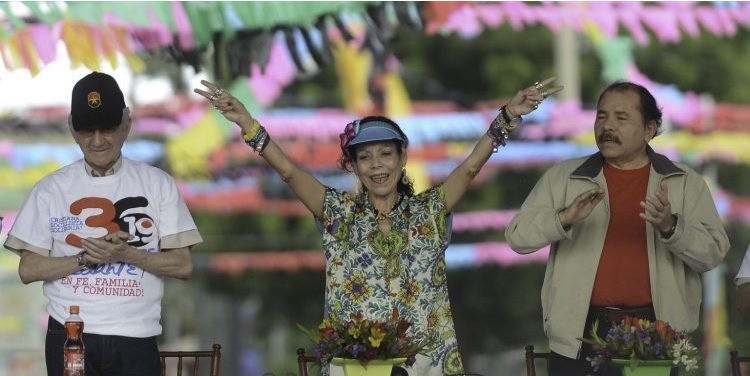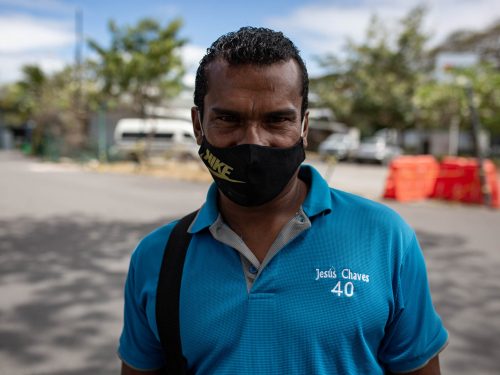
The presidental elections in Nicaragua on November 7 marked a new stage in the socio-political crisis that has dominated that country for more than three years. Daniel Ortega managed to hold onto executive power for the fourth consecutive time since 2007 in a questioned electoral process, marked by ousting political parties, imprisoning candidates and systematically persecuting journalists, activists and members of civil society.
According to information from the Supreme Electoral Council (CSE for the Spanish acronym), the country registered 65% participation from the population living in national territory (Nicaragua doesn’t accept votes from citizens living abroad). The institution declared Daniel Ortega and Rosario Murillo as winners with 76% of those votes.
However, the Urnas Abiertas (Open Ballot Boxes) citizen observatory’s independent delegates registered that less than 20% of the voting population participated in these elections. On social media, members of civil society denounced that community party leaders forced them to vote under intimidation and threats of losing pensions, jobs or state benefits such as food stamps for low-income families.
Ortega prevented international journalists and observers from the Organization of American States (OAS) from entering the country to verify the electoral process, as is done in the rest of the countries on the continent. Of course, the government welcomed at least a dozen political groups and international communicators who support the ruling party, the Sandinista National Liberation Front (FSLN for the Spanish acronym), including Costa Rican Roberto Zelaya, legislative candidate for the Pueblo Unido (United People) party.
That same night, the president of Costa Rica, Carlos Alvarado didn’t recognize the elections in Nicaragua, described Ortega and Murillo’s government as “undemocratic” and called on the international community to establish dialogues to find solutions for the crisis of the Nicaraguan people.
That same Sunday, the Inter-American Court of Human Rights (IACHR) declared that the electoral process in Nicaragua did not meet the minimum democratic standards and therefore did not recognize the election results.
In the last year, the State [of Nicaragua] undertook a process to eliminate any real competition and any capacity of the political opposition to participate in the electoral contest with minimum guarantees,” the Court ruled through a report published on the same day of the elections.
The Voice of Guanacaste collected questions about the electoral process in the neighboring country. We answer those questions here:
Why are there countries that don’t recognize the electoral process in Nicaragua?
Because, according to the IACHR, Nicaragua didn’t give any guarantee of electoral autonomy to ensure transparency in the process. Ortega manipulated all the powers of the State in his favor for more than a decade and made it inevitable that the results will always come out in his favor.
One of the most vulnerable conditions in the process is the imprisonment of political figures who expressed their interest in the presidency. Within weeks of announcing their possible candidacies, the National Police arrested them under laws imposed by presidential decree, including cyber crimes or being foreign agents. This disqualified any kind of real competition on the ballot.
Another condition that clouds the legitimacy of this process is the lack of transparency in access to information that Nicaragua has had since the beginning of the Ortega government, the persecution of the independent press and the rejection of independent observers.
To the IACHR, these types of repressive strategies reduce the credibility of the elections.
And how did he get so much power?
We have to go back in time since the Ortega Murillo’s have been pulling the strings behind this scene for more than a decade. Daniel Ortega served his first presidential term between 1985 and 1990. Since then, he was the FSLN’s candidate during every presidential election until his second victory in 2006.
As of his second term in office, Ortega began to strategically place his allies in important positions in all branches of the State, according to reports from organizations such as the IACHR and Connectas journalistic investigations.
According to a report from the Carter Center, for the 2011 elections, Ortega modified laws by presidential decree to place magistrates in line with his agenda in the CSE, the body that oversees electoral polls.
By 2011, the FSLN came off victorious in the executive branch and managed to fill more than 60% of the legislative seats with their party members.
No opposition party recognized the defeat and they denounced more than a hundred abnormalities in the voting centers, but the CSE affirmed that none of those complaints were valid or real.
In 2014, with the Senate in his favor, Ortega managed to modify the Constitution to enable indefinite presidential re-election, the possibility of electing the president in the first round with a simple majority (majority of votes of the people who participated in the electoral process and not of the entire body of voters in the country) and the promulgation of decrees with force of law, in other words without the need for legislative discussion.
By 2016, Ortega succeeded in nominating his wife, Rosario Murillo, as a candidate for the vice presidency without objections from any opponent with political power. So for the first time in the country’s history, two family members managed to share the executive positions.
With these abilities — which no other executive branch in the region has — after protests broke out in 2018, Ortega and Murillo implemented more laws to oppress opposition actions and arrest anyone who presented a threat to their government, or as Ortega himself affirms, “against his country’s sovereignty.”
So who are the presidential candidates who did participate?
On the ballot, there were “zancudos” (mosquitoes), in other words, parties that aren’t really opposition parties but often work hand in hand with the ruling party. With little less than a month to go before the elections, none of these candidates occupied a relevant role in Nicaraguan politics or in the country’s media coverage.
The media outlet Nicaragua Investiga denounced that these candidates negotiated with the FSLN to participate in the elections and receive a kind of “reimbursement” for election expenses.
Walter Espinoza and Mauricio Orue are low-profile legislators in the Legislative Assembly, and although they identify themselves as opponents, they constantly vote in favor of government projects. For his part, Marcelo Montiel is a businessman who denies the existence of a dictatorship in the country, while Gerson Gutierrez Gasparin ran due to “an inspiration from the Holy Spirit.” Finally, candidate Guillermo Osorno is an evangelical pastor from the Assemblies of God and was the only one who didn’t recognize Ortega’s victory in these elections.
On November 10, following Osorno’s statements against the election result, the Ortega government canceled the programming licenses of a channel and a radio station owned by the pastor.
Confidencial, another independent Nicaraguan media, stated that all of the participants filled their legislative ballot papers with the names of friends and relatives close to the candidates and party presidents.
What about the presidential candidates who are still imprisoned in Nicaragua?
Nobody knows. To date, the Prosecutor’s Office has taken refuge in presidential decrees to arrest and keep at least 39 opponents in prison, seven of whom expressed interest in being candidates for the presidency. In addition, their relatives denounce that according to what they have been able to gather through short visits and anonymous reports, these political prisoners are being subjected to physical and psychological violence within the country’s prisons.
On Tuesday, November 8, during the victory speech he made to his followers, Daniel Ortega spoke about the political prisoners:
Those who are imprisoned are the sons of bitches of the Yankee imperialists. They should be taken to the United States, because they aren’t Nicaraguans. They stopped being Nicaraguans a while ago,” the president indicated.
In his message after the results, President Alvarado demanded the release of political prisoners, some imprisoned since July of this year.
So what will happen now in Nicaragua?
It’s impossible to predict. Following the outcome of the elections, U.S. President Joe Biden promulgated the Reborn Act. This allows Nicaragua to be excluded from the Free Trade Agreement with the US, which will force multiple U.S. companies to pull out, such as call centers and business chains.
The law also adds Nicaragua to the Central American countries of the northern triangle, whose state officials are subject to visa restrictions due to corruption. The regulation will also allow the United States to further investigate relations and financing between the Russian government and Nicaragua.
Costa Rican Foreign Minister Rodolfo Solano affirmed that there is a possibility that the election results will trigger more intense migratory flows to Costa Rica. However, there is no data available yet to confirm this.
For now, Ortega will continue to control the country until 2027 along with his wife, Rosario Murillo.







Comments